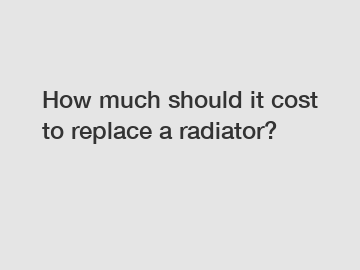How much should it cost to replace a radiator?
Replacing a radiator can be a costly repair for many car owners. The radiator is a crucial component of a vehicle's cooling system, responsible for regulating the engine's temperature to prevent overheating. When it comes time to replace a radiator, it's essential to understand the factors that determine the cost of this repair. In this article, we will discuss how much it should cost to replace a radiator and what factors can influence the price.
Factors that Influence the Cost of Replacing a Radiator.
When determining the cost of replacing a radiator, several factors come into play. These factors can vary depending on the make and model of the vehicle, as well as the location of the repair shop. Here are some key factors to consider:

1. Make and Model of the Vehicle: The make and model of the vehicle can have a significant impact on the cost of replacing a radiator. Some vehicles may require specialized radiators that are more expensive to purchase and install. Additionally, luxury vehicles or high-performance cars may have more complex cooling systems that can increase the overall cost of the repair.
2. Type of Radiator: There are different types of radiators available, including aluminum, copper, and plastic. Aluminum radiators are typically more expensive than copper or plastic radiators, but they are also more durable and efficient. The type of radiator you choose for your vehicle can affect the overall cost of the replacement.
3. Labor Costs: The cost of labor for replacing a radiator can vary depending on the location of the repair shop and the expertise of the technicians. In general, labor costs for this type of repair can range from $200 to $500 or more. It's essential to consider the labor costs when budgeting for a radiator replacement.
4. Additional Parts and Materials: In addition to the radiator itself, there may be other parts and materials required for the replacement, such as coolant, hoses, clamps, and gaskets. These additional parts can add to the overall cost of the repair, so it's essential to factor them into your budget.
5. Warranty: Some repair shops offer warranties on parts and labor for radiator replacements. While this can provide peace of mind, it may also increase the overall cost of the repair. Be sure to inquire about any warranties offered by the repair shop before proceeding with the replacement.
Cost Estimates for Replacing a Radiator.
On average, the cost of replacing a radiator can range from $300 to $900 or more, depending on the factors mentioned above. It's essential to get estimates from multiple repair shops to compare prices and ensure you are getting a fair deal. Keep in mind that the cheapest option may not always be the best choice, as quality and expertise are essential when it comes to radiator replacements.
Conclusion.
Replacing a radiator is a necessary repair to keep your vehicle running smoothly and prevent engine damage due to overheating. Understanding the factors that influence the cost of this repair can help you budget accordingly and make an informed decision. By considering the make and model of your vehicle, the type of radiator, labor costs, additional parts and materials, and any warranty options, you can determine how much it should cost to replace a radiator for your specific vehicle.
If you are in need of a radiator replacement, contact us today for a quote and expert service. Our team of experienced technicians can help you with all your radiator replacement needs.
Contact us to discuss your requirements of commercial vehicle radiator, what is the radiator in a car, Aftermarket Car Radiators For Sale. Our experienced sales team can help you identify the options that best suit your needs.


